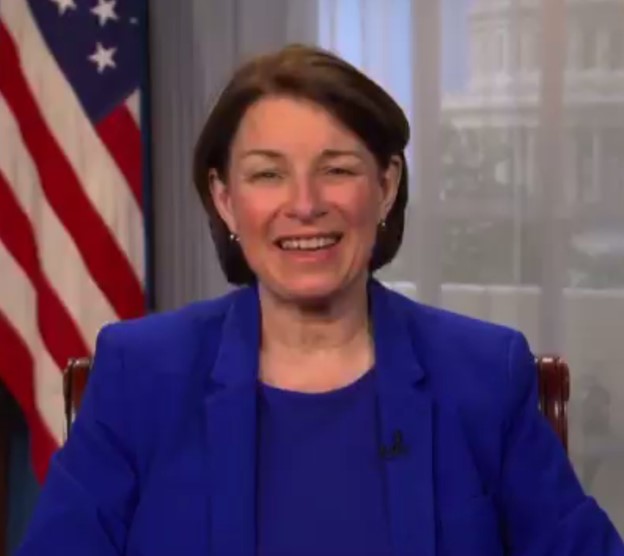Sen. Amy Klobuchar Pushes ‘Competition Policy’ to Enhance Antitrust Crackdown
Describes need for reining in telecom/tech/platforms at SOTN keynote
The smarter way to stay on top of the multichannel video marketplace. Sign up below.
You are now subscribed
Your newsletter sign-up was successful
Sen. Amy Klobuchar (D-Minn.) outlined an aggressive plan to legislate a “competition policy” that she envisions will be accompanied by increased antitrust enforcement, especially in the technology and digital platform sector. In the closing keynote address to the State of the Net conference on Wednesday, she voiced concern that America could “emerge from this pandemic with markets that are more concentrated and less competitive than before this crisis.”
“Even before the pandemic, it was clear that America has a major monopoly problem,” she said. “It's a problem that threatens the strength and dynamism of our economy,” she added, calling it a “plague on our tech market.”
As a member of the Judiciary Committee’s Subcommittee on Antitrust, Competition Policy and Consumer Rights and of the Communications, Technology, Innovation and Internet subcommittee of the Senate Commerce Committee, Klobuchar is well positioned to lead this anti-monopolist assault.

Klobuchar, in pre-recorded remarks, told the virtual SOTN event that, “Antitrust law isn't the only potential tool we have to foster the kind of competition we need.” She is pushing the term “competition policy” (a term she uses in her forthcoming book on the topic).
Also Read: Klobuchar Bill Would Provide New Antitrust Tools to Address Edge Giants
“That distinction is particularly important in digital markets, which are relatively new and largely unregulated,” she explained, adding that the new leadership at the antitrust agencies plus the Democratic majorities in the Senate and the House enable policymakers to make such objectives “a priority for the first time in decades.”
She said the government must play a role when so much technology power is “controlled by a handful of companies that have amassed unprecedent power gateways … over our personal data, power over what ads we see [and] what news we watch.”
The smarter way to stay on top of the multichannel video marketplace. Sign up below.
Also Read: Michael Powell Pitches FCC Unity
Klobuchar acknowledged that Congress is “not as sophisticated as the companies that we should be regulating.”
“So we need to start by working to strengthen antitrust enforcement and making it more effective,” she explained, noting that she’s heard complaints “about the big tech platforms using their dominance to undermine rivals and limit competition for a long time.”
“Unfortunately, it took years for the antitrust agencies to get serious about enforcement in the tech center,” Klobuchar said. She noted that recent Justice Department and Federal Trade Commission actions against Google and Facebook, with the support of state Attorneys General, may open the doors for “structural relief.” She envisioned a “break-up remedy” that could separate assets and engender competition among the offspring, citing her early career experience as a young lawyer working on behalf of MCI during the break-up of the Bell System and the old AT&T. She contended that breakups aren’t necessarily “radical. They're one way to deal with a competition issue.”
Confronting Judicial Barriers
“It's no secret that our increasingly conservative federal judiciary has been more antagonistic to antitrust enforcement, raising the procedural and evidentiary bar for government and private enforcement,” she fretted, citing a former Justice Department official who observed no plaintiff has won an antitrust case before the Supreme Court in more than 15 years. The Minnesota Senator also pointed out that the DoJ’s roster of antitrust lawyers has dropped from 453 to about 330 during the past 40 years. At the FTC, the legal staff has receded even further: from 1,719 to 1,102 during a similar stretch (1980 to 2018).
“How are you going to be able to take on these big tech companies, much less others, if you don't have the resources?” Klobuchar asked. She explained that increased filing fees for megamergers would generate revenue to beef up enforcement staffing.
“If we want our enforcers to be able to go toe-to-toe with the largest, most sophisticated trillion-dollar companies in the world, we shouldn't force them to operate on a shoestring,” she said. Klobuchar cited her proposed “Consolidation Prevention and Compassionate Competition Promotion Act” as a way to strengthen the current legal standards in the Clayton Act by updating legal standard to prohibit anti-competitive mega-mergers. “The bill shifts the burden to those dominant firms to prove that their exclusionary conduct doesn't risk harming competition.”
Contributor Gary Arlen is known for his insights into the convergence of media, telecom, content and technology. Gary was founder/editor/publisher of Interactivity Report, TeleServices Report and other influential newsletters; he was the longtime “curmudgeon” columnist for Multichannel News as well as a regular contributor to AdMap, Washington Technology and Telecommunications Reports. He writes regularly about trends and media/marketing for the Consumer Technology Association's i3 magazine plus several blogs. Gary has taught media-focused courses on the adjunct faculties at George Mason University and American University and has guest-lectured at MIT, Harvard, UCLA, University of Southern California and Northwestern University and at countless media, marketing and technology industry events. As President of Arlen Communications LLC, he has provided analyses about the development of applications and services for entertainment, marketing and e-commerce.

